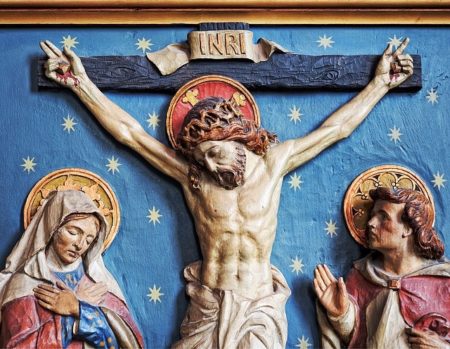Lent with a Wesleyan Accent by Matt Sigler

Interestingly, John Wesley omitted the Lenten season from the Sunday Service of the Methodists in North America, his edition of the Book of Common Prayer that he sent to the Methodists in America. His omission is likely because of the emphasis he placed on the constant practice of scriptural holiness. Methodists were not to limit their pursuit of holiness to particular times of the year. Wesley’s omission is more of an indictment of the nominalism of much of the Church of England during his day than it is on Lent itself. Yet this was my response when, as a college student, I was asked over lunch what I was giving up for Lent. My rather self-righteous reply was “I don’t need a particular season in order to practice fasting.” Since then, however, my position on observing Lent has taken quite a different turn. Here are three reasons why I observe Lent as a Wesleyan.
One Great Motivation
The Christian practice of observing Lent is motivated by one great longing: “I want to know Christ…” Paul’s words are the cry of all of us who love the Christ. Every attempt at knowing Jesus leads us to the cross. We are reminded of Jesus’ words in Matthew 16 that if we want to “come after” Jesus, we too must go to the cross. This is the godly motivation of observing Lent; something that can all too easily get obscured by the giving up of trifle indulgences on the one hand, or self-flagellation on the other—the type of Lenten practices Wesley rejected.
Full Surrender is the Catalyst for Christian Perfection
Observing the season of Lent forces us to be intentional about dying with Christ. Lent provides us the opportunity to journey with Christ in the desert and remember that all of the devil’s promises are rooted in one great lie: that we can find ultimate fulfillment on our own terms. The spiritual practice of fasting—something Wesley did weekly—is given pinpoint focus during this time. We fast to remind ourselves that only Jesus is enough. And in this time we are called to fully surrender our lives to Him. This is an exercise of our will, a laying down of all that we are. As Wesleyans, we should note that fully surrendering our lives to Christ is the prime catalyst for sanctification.
Amplifying Easter
It should come as no surprise that Wesley kept Easter in the Sunday Service as the primary Christian feast. He, like most Christians, recognized the centrality of the Resurrection. Lent, in fact, is ultimately about Easter. A celebration of Easter without a prior descent into the grave is dishonest and naïve, just as observing Lent without the uncompromising proclamation of the Resurrection is hopeless. The liturgy that bookends the Lenten/Easter journey reminds us of this. It begins with acknowledging our mortality and utter need for the Lord: “From dust you have come, to dust you will return.” Lent ends with the ancient, joyous proclamation: “Christ is Risen from the dead, trampling down death by death, and upon those in the tombs bestowing life!” During the Lenten season, we journey to the cross in hopes that we might die with Christ to be raised to life with Him. In observing Lent as a Wesleyan, I am reminded that John and Charles Wesley were persons clearly gripped by the Story of God. This is what Lent is ultimately about: living more fully into that Story.
About five years after my conversation in the college cafeteria, I decided to dive into the season of Lent for the first time. My desire was simply to follow Christ into His Story. It was a powerful forty days that ended with the Easter Vigil, an ancient service that traces the story of God’s salvation in Christ, marking the transition from Lent to Easter. During the service, I was struck, in a way too deep for words, with the reality that I had died and my life was now “hidden with Christ in God.” The memory of that moment continues to be one filled with grace.
John Wesley did not live to see the significant changes that were made during the Second Vatican Council. He was never impacted by the Liturgical Renewal Movement of the 20th century. In many respects, both movements sought to reform the observance of Lent in a direction that Wesley would have been quite pleased with. As a Wesleyan, I fully embrace the season of Lent as a season of renewal; not a time of temporarily embracing certain spiritual disciplines, but a season to dive deeper into the Story—an opportunity for God to continue His sanctifying work in me.
